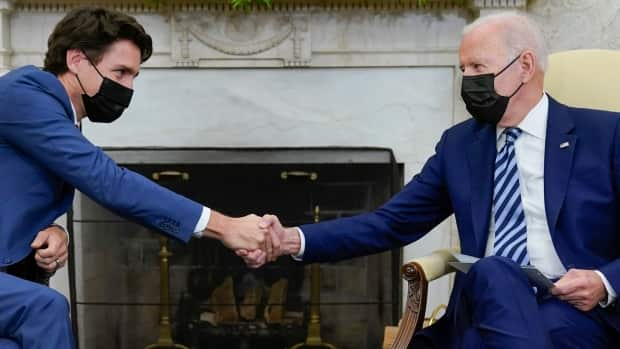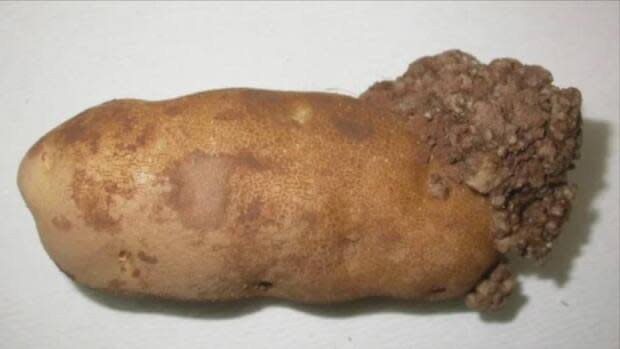Federal agriculture minister 'working extremely hard' to resume fresh potato trade with U.S.

Ending a suspension of trade in fresh potatoes from P.E.I. to the United States is a top priority for the Canadian government, says federal Agriculture Minister Marie-Claude Bibeau.
The trade suspension was ordered by the Canadian Food Inspection Agency on Monday, following the discovery of potatoes infected with potato wart in two P.E.I. fields in October. Bibeau told CBC's Island Morning host Mitch Cormier she understands how important potatoes are for the P.E.I. economy and even the identity of Islanders.
"I really get it, and I am working extremely hard with the team to solve the situation as soon as possible," said Bibeau.
"I am confident that we will convince the Americans that our fresh potatoes are safe, they do not present a risk for their soil, for their land. And they desperately need our very high-quality potatoes as well."

Potato wart disfigures potatoes and reduces crop yield, but is not a threat to human health. The U.S. lists it as a serious threat to agriculture.
CFIA implemented the suspension to forestall a ban from the American side. Bibeau said she feels trade will resume more quickly if trade is stopped from the Canadian side of the border.
"I know that it hurts, but I prefer to keep control on our Canadian side than be subjected to an American ban," she said.
'They have to be reassured'
P.E.I. farmers this year had been celebrating the best harvest in generations. With below-average crops in Manitoba and Alberta, prices were also good.
The P.E.I. Potato Board estimates the value of P.E.I. potato exports to the U.S. at $120 million.
In a news conference Monday, P.E.I. Premier Dennis King strenuously objected to the suspension, saying it was based on politics and not on science.
Bibeau said Canada needs to reassure its American trading partner that P.E.I. potatoes pose no risk of spreading potato wart.
"Science is not black or white. I think they are going beyond and they are asking for too much, but, I mean, it is still a scientifically based discussion that we have to have," she said.
"They have to be reassured that even if we have found more cases on the Island that our protocols are strong enough."
Those protocols may need to be strengthened, said Bibeau.
P.E.I. potato growers blindsided
Randy Visser, a potato farmer and packer from Orwell Cove, P.E.I, said he couldn't have ever foreseen the decision.
"All these machines where running at full capacity, and today they're quite idle and quiet," he said.
He said the suspension shuts off P.E.I. from important markets in the U.S. East Coast and the American territory of Puerto Rico, representing about 70 per cent of their sales and volume. It potentially impacts both staffing and storage.
"We have potatoes in storage and we have a schedule laid out to ship approximately a million-plus pounds a week through this plant. You can imagine how quickly that will start to bunch up. Eventually, we may run out of time to move those potatoes."
Ray Keenan, owner of Rollo Bay Holdings, say it could take years for the industry to recover if the suspension isn't lifted soon. About half of his farm's product is U.S.-bound.
"Everybody's business plan was destroyed overnight," he said.
Farmers aren't the only ones affected
Trucking companies on P.E.I. were also left reeling by the news of the suspension.
"My stomach turned over," said Scott Annear, co-owner of Morley Annear Ltd., which delivers potatoes to Boston, Pennsylvania, Florida and sometimes as far as Texas.
"We don't know how long this is going to last. We don't know what our options are. I'm sort of at a loss for words," he said, noting about a third of his business is exports to the U.S.
"It's devastating."
Tyson Kelly, owner of Bulk Carriers, said he was shocked by the news. While he is already booking to ship other products to replace that potato business, he said the loss of shipping will be a further economic impact for the province.
"There's other products that we can ship," said Kelly.
"For us it's not as devastating as it is for all our local farmers. At the end of the day the farmers are the ones impacted to the greatest extent."
In statement jointly attributed to agriculture critic John Barlow and health critic Luc Berthold, the Conservative Party said the suspension was evidence of a failed trade relationship between the Liberal government and the U.S.
"In classic Liberal fashion, this ban was made in the middle of the night, with no consultation and no plan to support the workers impacted by this decision," the statement said.
The statement demanded a detailed plan to support P.E.I. farmers.
American potato growers say it's not a 'Canada vs. U.S.' issue
Kam Quarles, CEO of the U.S.'s National Potato Council, said he was sympathetic toward the province's potato farmers, but that the suspension was necessary.
"I think anyone involved in agriculture anywhere in the world, at some point, is going to deal with pest and disease issues, and it's just a matter of time," he said.
"It's unfortunately a very difficult situation and we're hopeful that it's dealt with efficiently — both by the CFIA, and we stand ready with the U.S. to deal with it efficiently as well."
WATCH | P.E.I. vows to fight potato export ban:
Quarles said suspending seeds potato exports alone was not enough, and that the recent potato wart detection showed there were additional pathways for the fungus to get into U.S. fields.
He said the situation is far more complicated than just "some kind of trade dispute."
"Certain folks have wanted to make this a Canada vs. U.S. issue," Quarles said. "Economically, this doesn't help the U.S., not one bit.
"Our folks need P.E.I. seed. We process P.E.I. potatoes in the U.S. This is not an issue that is beneficial to the U.S. in any way."
The council said in a release Monday that the spread of the fungus to American farms could threaten their access to international fresh potato markets, costing the U.S. industry more than $225 million in annual sales.
No incidents of potato wart spread
Potato wart was first discovered on the Island in 2000.
Measures were put in place to control its spread, including restrictions if the fungus is detected in a field.
"No production of potatoes, including seed, table or processing potatoes, is allowed. No other propagative crops are allowed to be produced in that field," according to Dr. Carolyn Sanford of the P.E.I. Department of Agriculture.
The soil can't be moved, and all equipment and vehicles have to be cleaned and disinfected before they can leave the field.
There have since been more than 30 incidents of potato wart on the Island, but the P.E.I. Potato Board said there has not been a single incident of the fungus spreading anywhere else from Island potatoes.

Canada suspended trade in seed potatoes from P.E.I. in connection with the October discovery earlier this month, and has known there has been a threat to fresh potato exports for about a week.
It has kept the P.E.I. government advised of the situation, said Bibeau. She said she has had three discussions with U.S. Agriculture Secretary Tom Vilsack in the last week, and Prime Minister Justin Trudeau discussed the issue with President Joe Biden at a meeting in Washington last week.
In a statement released on Twitter late on Monday, Cardigan MP Lawrence MacAulay, P.E.I.'s representative in the federal cabinet, called the situation "absolutely unfair to our farmers on P.E.I."
But he agreed with Bibeau that it was better for CFIA to act, rather than have to deal with a ban from the U.S. side.


